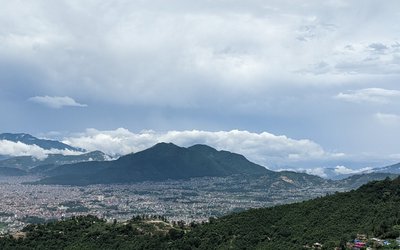
Nation Building And Ethnicity In Nepal: Theory & Practice
By Prof. Dr. Ananta Raj Poudyal
Published by Pragyan Foundation, Phone 9841298838 01-4415452, Email: anantamaligown@gmail.com
Price: Rs. 1200.00 (Hard cover), Rs. 1000.00 (soft cover)
Distributed by Mandala Book Point (Kantipath, Kathmandu) Telephone: 01-4227711
In recent years, a good number of books in political studies have appeared in the market. The political change of 1990 ushered in a new era encouraging scholars to write various kind of books. A host of scholars started writing books on Nepali poltics. A blizzard of writings appeared in Nepali and foreign languages. However, the donor agencies were influential to create the situation to encourage writings in the name of nurturing democracy in the country.
Meanwhile, a new book entitled, “Nation Building and Ethnicity In Nepal: Theory & Practice” written by Dr. Ananta Raj Poudyal has appeared in the market. The book is an outcome of teaching and research by the professor for almost forty years in prominent universities of the world. Treating politics as the science of state, designed to attain objectives like the constitutional order, security and welfare, the book shows its concern with the question: to what extent have the objectives met in the country? Are institutional value and stability achieved? Is human happiness provided? Based on the rigorous theory of political analysis, the book does not only deal with the superficial aspects of nation building, but also elaborates on the theory and practice. A study of centrifugal and centripetal forces of nation building are included to understand the comprehensive aspects of nation building. These forces are functional aspects of politics.
Comprising 352 pages, the book is divided into four chapters. The first chapter deals with the issues like nation state, state building, nation building, national integration, ethnicity, ethnic nation, characteristics of a nation state, concept of minority, indigenous people, ethnicity & linkages, ethnic conflict, nation destruction, meaning of political development and nationalism. The second chapter deals with the charecteristics of Nepali society, people of Nepal, social change, modernization, state building of Nepal, democracy, monarchy and nation building of Nepal. The third chapter is on the ethnicity in Nepal, different ethnic groups, the Maoist movement and ethnicity, discrimination, continuity and change, along with various tables reflecting the trends of ethnic participation. And, the fourth chapter consists of summary and recommendations. In essence, the book shows democracy and nationalism are inseperable. Professor Poudyal concludes that “the sense of nationalism is inconceivable without the idea of popular sovereignty” and weighs the outcome of the popular uprising of 2006.
The professor argues political parties are vehicles for democracy, but in Nepal, the political leadership is proven as inept and insipid. Explaining the entire political process in Nepal, including constitution building, he points out that the dissolution of the CA has created a political vaccum and democracy is under seize. After analyzing the political development of Nepal, the author argues that the situation of Nepal is like a failed state.
The author does not claim anything new in ideas, as there are a host of such books available in the Western world including in Nepalese market. Under the field of comparative politics, professor Poudyal has included the issues like the nation destruction, national integration, disintegration, ethnic conflict and etc. He argues that this area is advanced by the American political scientists in 1950s & 60s, taking into account the vulnerable situation of political development in the new nations. He draws the conclusion that Nepal is also a new nation despite her long history of independence. The situation of political instability and economic underdevelopment are perpetual phenomena of Nepal. It indicates that she has to travel a long way. The book is “sui generis” or of its own kind. The book tries to explore the inner dynamics of the Nepali politics over the centuries. The gap between the rulers and the ruled in Nepal is never ending, people are always in the receiving end. The author’s non-conformist approach, with application of the functional aspect of politics, is the outcome of the book.“Yet the political parties are not sincere and behave like the predators. Majority of the people are poor. They do not have food to still the pangs of hunger, clothes to cover bones, and shelter to live in," said Professor Poudyal. "It is true that one cannot make a nation out of deprivation, the sense of deprivation is rampant in the country."
He holds the view that the objectives of politics like the constitutional order, security and welfare are seen as the wild goose chase. The dangerous trajectory of dissent is seen because the ethnic conflict is on rise making a volcanic eruption. "The concept of welfare state is not yet realized. Thus, the book refers to an analogy that ‘Nepal is not yet a nation,’ only notion to hope.
“Nation building is the multi-dimensional process that has not yet begun," said Poudyal. It appears that the political change is under the influence of the “thar ghar” ever since it started dominating the politics of the country. He further said the major political leaders in the CA worked in common to disrupt the process.
"Therefore, the CA proved a failure to deliver a constitution. Subsquently, the CA ended in a fiasco. Error is the human phenomena, so the author absolves responsibilities for any kind of mistake in the book," said professor Poudyal.
- MELAMCHI WATER SUPPLY: No Interruption During Monsoon
- Jun 25, 2025
- KOREAN RETURNEES: Successful Integration
- Jun 25, 2025
- UPPER TRISHULI-1: Engaging With Local
- Jun 25, 2025
- IME GROUP: Twenty Five Years Of Journey
- Jun 24, 2025
- NEPAL’S AIR POLLUTION: A Growing Health Concern
- Jun 24, 2025















